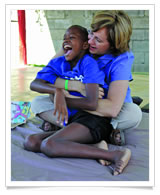by Barbara A. Below

On a beautiful spring evening in Palmar Arriba, Dominican Republic, as pictures were displayed on a makeshift screen set up in the street outside the three-bedroom home, little Ramona stood in the spotlight and danced. Along with over 200 other people who gathered from the community, Ramona enjoyed the dedication of the Good Shepherd Lutheran Home, a group home for children with disabilities, where she and five other children with developmental disabilities now live.
This is their new home, the community in which they attend church and school. This is their new life. This is their future. It was just five years ago that Danelle Putnam, LCMS Developmental Disabilities Outreach Missionary, and Rev. Walter Ries, Jr. of the Evangelical Lutheran Church in Brazil, came to the Dominican Republic and began the Witness emphasis of this LCMS mission through evangelistic outreach efforts and theological education.
Five years ago, Willy Gaspar had asked the missionaries to come to Santo Domingo and “teach us about Jesus.” In March 2010, the Witness efforts of the mission resulted in the ordination of the first Dominican Republic Lutheran pastor. Together with Rev. Ted Krey, LCMS Regional Director for Latin America, the mission work in the Dominican has never slowed down and has now expanded to include several congregations and preaching stations, where people gather weekly to hear the Gospel proclaimed and to receive the Sacraments.
While the Dominicans were learning about the Church through the Scriptures and the Lutheran Confessions, the missionaries were also teaching them how to be the Church by reaching out with Christ’s mercy to the many orphaned and disabled children in the Dominican Replublic. These little ones are cared for by the government in institutional settings, where they receive minimal attention, limited medical treatment, no education and no therapy services to improve their condition.
That’s why, from the beginning, the Lutheran mission desired to better the lives of and care for these children through acts of Mercy. Over many years of working with and visiting these institutions, an agreement was reached in December 2010 with the Dominican government to allow the first six children to be placed at the Good Shepherd Lutheran Group Home.
While everyone involved gave thanks and praise to God for His great wonder and many glories revealed in the Witness and Mercy work of the mission, the Dominican Republic Lutheran Mission was also expanding its role in the koinonia or Life Together emphasis of the mission. In September 2010, the mission opened the doors of Concordia Lutheran School in Palmar Arriba.
There the school provides a Lutheran education to 80 children with plans to double enrollment next year. In March 2011, mission leaders signed an agreement with the Evangelical Lutheran Church of Argentina to assist in theological education with the goal of establishing a Lutheran seminary in the Dominican Republic by 2017.
No wonder Dr. Jack Preus of Bethesda Lutheran Communities of Watertown, Wis., at a recent partnership meeting in the Dominican Republic, spoke in favor of the President’s three-fold emphasis and humorously quipped that “The Dominican mission was doing Witness, Mercy, Life Together long before President Harrison came up with the idea.” While Witness, Mercy, Life Together is the President’s emphasis for our Synod, it is also the way in which the New Testament church operated (Gal. 2:9–10). Both Jews and Greeks bore Witness to the Gospel, extending the right hand of fellowship in Life Together and showing Mercy to the poor.
As this was the model for the first-century church, so also has it become the way of life for the Dominican Republic Lutheran Mission and a way to move forward into the future for The Lutheran Church—Missouri Synod. The President’s Transition Team and the Restructuring Work Group, charged with developing recommendations for a new structure, used these three emphases to think about how best to reorganize and focus the work of the national office.
The recommendations adopted by the President will organize the national office around work teams and program units that focus on the emphasis of Witness, Mercy, and Life Together. Just as in the Dominican mission field Witness efforts are done side-by-side with Mercy and Life Together efforts, so too must the program units of the national office work side-by-side, thus ridding the national office of a “siloed” culture, one of the desired accomplishments for restructuring mentioned in Res. 8-08A.
As Ramona danced, she celebrated the new life and future she is able to enjoy at the group home. Many others recently celebrated the ordination of the first Dominican Lutheran pastor, Rev. Willy Gaspar, and the bright future of the Lutheran Church in the Dominican Republic. We in the LCMS have much to thank and praise God for because of all that He has accomplished in the Dominican Republic.
The wonders He has done there show us that our own future with the Lord is a bright one as our Synod presses forward to bear Witness to the Gospel, to grow in showing Mercy and to rejoice in our Life Together around a common confession of Jesus Christ, our crucified and risen Savior. To God alone be the glory!
—
> For more stories on Witness, Mercy, Life Together, visit www.lcms.org/partnerstories > “We have therefore for our synodical work a clear and simple rule: Everything that does not serve the course of the Gospel . . . does not belong in the circle of our considerations” (Friedrich Pfotenhauer, 1911).
> God is faithful, by whom you were called into the fellowship of His Son, Jesus Christ our Lord (1 Cor. 1:9).
About the Author: Barbara A. Below serves as assistant to LCMS President Rev. Matthew C. Harrison.
May 2011


